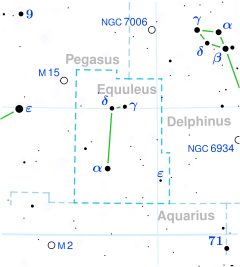3 Equulei
| Observation data Epoch J2000 Equinox J2000 | |
|---|---|
| Constellation | Equuleus |
| Right ascension | 21h 04m 34.65147s[1] |
| Declination | +5° 30′ 10.3032″[1] |
| Apparent magnitude (V) | 5.593[2] |
| Characteristics | |
| Spectral type | K5 III[3] |
| U−B color index | +1.934[2] |
| B−V color index | +1.651[2] |
| Astrometry | |
| Radial velocity (Rv) | –15.26 ± 0.2[4] km/s |
| Proper motion (μ) | RA: +13.15[1] mas/yr Dec.: +0.66[1] mas/yr |
| Parallax (π) | 4.24 ± 0.42 mas[1] |
| Distance | 770 ± 80 ly (240 ± 20 pc) |
| Absolute magnitude (MV) | –1.02[5] |
| Details | |
| Radius | 63[6] R☉ |
| Luminosity | 949[7] L☉ |
| Temperature | 3,893[8] K |
| Rotational velocity (v sin i) | 4.6[7] km/s |
| Other designations | |
| Database references | |
| SIMBAD | data |
3 Equulei is a single[3] star located in the small northern constellation of Equuleus. It is faintly visible to the naked eye at an apparent visual magnitude of 5.6.[2] Based upon an annual parallax shift of 4.24 mas,[1] 3 Equulei is roughly 770 light-years (240 parsecs) distant from Earth, give or take an 80 light-year margin of error. At that distance, the apparent brightness of the star is diminished by 0.15 in visual magnitude because of extinction from interstellar gas and dust.[4]
3 Equulei has been referred to in some sources as ζ (Zeta) Equulei, although it was not given that designation by Bayer.[10]
Properties
[edit]3 Equulei is an evolved giant star with a stellar classification of K5 III.[3] The measured angular diameter of this star, after correction for limb darkening, is 2.44 ± 0.03 mas.[11] At the estimated distance of 770 light-years,[1] this yields a physical size of about 63 times the radius of the Sun.[6] It is radiating an estimated 949[7] times the luminosity of the Sun from this expanded outer envelope at an effective temperature of 3,893 K.[8] At this heat, it shines with the orange-hued glow of a K-type star.[12]
References
[edit]- ^ a b c d e f g van Leeuwen, F. (November 2007), "Validation of the new Hipparcos reduction", Astronomy and Astrophysics, 474 (2): 653–664, arXiv:0708.1752, Bibcode:2007A&A...474..653V, doi:10.1051/0004-6361:20078357, S2CID 18759600.
- ^ a b c d Cousins, A. W. J. (1984), "Standardization of Broadband Photometry of Equatorial Standards", South African Astronomical Observatory Circulars, 8: 59, Bibcode:1984SAAOC...8...59C.
- ^ a b c Eggleton, P. P.; Tokovinin, A. A. (September 2008), "A catalogue of multiplicity among bright stellar systems", Monthly Notices of the Royal Astronomical Society, 389 (2): 869–879, arXiv:0806.2878, Bibcode:2008MNRAS.389..869E, doi:10.1111/j.1365-2966.2008.13596.x, S2CID 14878976.
- ^ a b Famaey, B.; et al. (January 2005), "Local kinematics of K and M giants from CORAVEL/Hipparcos/Tycho-2 data. Revisiting the concept of superclusters", Astronomy and Astrophysics, 430 (1): 165–186, arXiv:astro-ph/0409579, Bibcode:2005A&A...430..165F, doi:10.1051/0004-6361:20041272, S2CID 17804304.
- ^ Ryon, Jenna; Shetrone, Matthew D.; Smith, Graeme H. (August 2009), "Comparing the Ca ii H and K Emission Lines in Red Giant Stars", Publications of the Astronomical Society of the Pacific, 121 (882): 842–856, arXiv:0907.3346, Bibcode:2009PASP..121..842R, doi:10.1086/605456, S2CID 17821279.
- ^ a b Lang, Kenneth R. (2006), Astrophysical formulae, Astronomy and astrophysics library, vol. 1 (3 ed.), Birkhäuser, ISBN 3-540-29692-1. The radius (R*) is given by:
- ^ a b c Henry, Gregory W.; et al. (September 2000), "Photometric Variability in a Sample of 187 G and K Giants", The Astrophysical Journal Supplement Series, 130 (1): 201–225, Bibcode:2000ApJS..130..201H, CiteSeerX 10.1.1.40.8526, doi:10.1086/317346, S2CID 17160805.
- ^ a b Soubiran, C.; Le Campion, J.-F.; Cayrel de Strobel, G.; Caillo, A. (June 2010), "The PASTEL catalogue of stellar parameters", Astronomy and Astrophysics, 515: A111, arXiv:1004.1069, Bibcode:2010A&A...515A.111S, doi:10.1051/0004-6361/201014247, S2CID 118362423.
- ^ "* 3 Equ". SIMBAD. Centre de données astronomiques de Strasbourg.
- ^ Hoffleit, D.; Warren, W. H. (1995). "VizieR Online Data Catalog: Bright Star Catalogue, 5th Revised Ed. (Hoffleit+, 1991)". VizieR On-line Data Catalog: V/50. Originally Published in: 1964BS....C......0H. 5050. Bibcode:1995yCat.5050....0H.
- ^ Richichi, A.; Percheron, I.; Khristoforova, M. (February 2005), "CHARM2: An updated Catalog of High Angular Resolution Measurements", Astronomy and Astrophysics, 431 (2): 773–777, Bibcode:2005A&A...431..773R, doi:10.1051/0004-6361:20042039
- ^ "The Colour of Stars", Australia Telescope, Outreach and Education, Commonwealth Scientific and Industrial Research Organisation, December 21, 2004, archived from the original on March 18, 2012, retrieved 2012-07-21.


